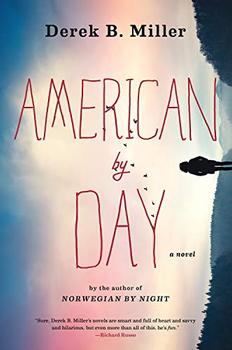Summary | Excerpt | Reviews | Beyond the Book | Readalikes | Genres & Themes | Author Bio

Excerpt
American by Day
Sigrid Ødegård's hands rest on the unopened blue folder as she stares out the window of her office. The seal of the Politi is embossed on the front in gold, red and black, meaning that someone decided to break out the good stationery for this one. It displays no author or title but she knows what it contains and she is in no rush to read it. Only two short months ago, in June, the entire city of Oslo, Norway, was trimmed with lilacs. Sigrid's father had once told her that the early summer flowers were her mother's favorite, and when the season was at its peak in Hedmark, their farmhouse was filled with them: a bouquet in each bathroom, a vase on the kitchen table. Their errant petals, he said, would drift through the house after her family as they journeyed its hallways stirring them up and scattering them in their wake. This collective movement - this collective memory - however, was thirty-five years ago. Sigrid was five years old when Astrid died. Sigrid wonders, looking out over the park with its August sunbathers and running children, whether those memories are even hers. They might have been given to her by her father. And if the memories are not hers, are they less precious or, perhaps, more?
She turns her attention from the window to the blue folder.
This, she's been informed, is the final report and verdict about the events last month that resulted in the shooting-deaths of four hostage-takers at a summer cabin near the Swedish border in the village of Glåmlia. She was the commanding officer and had made the decision to utilize the emergency response force - the Beredskapstroppen. Their assault killed three of the perpetrators. Sigrid, herself, killed the fourth.
Conscious of being watched through the glass by the prying eyes of her department, Sigrid flips open the cover but doesn't read the words. She should have closed the blinds after she'd received the folder from the young cop who'd knocked on her door to deliver it. He was blond and looked worryingly pale despite it being late summer. She'd found his boyish face immediately annoying.
"Thanks," she'd said, and started to close the office door.
"You're welcome," he'd said and then - oddly - extended his hand.
She couldn't think of a reason why he'd do this but she shook it to make it go away.
He seemed pleased with this and walked off.
During the past month the internal affairs department has been studying the events leading to the shootings in accordance with standard procedure. The report was standard procedure, though, only in the sense of being formalized; it was hardly common. The last time a Norwegian cop had fatally shot anyone was two years ago, in 2006, and before that it had been... forever. A decade? It simply didn't happen in Norway. Violent crime was very low, murder rarely happened, and when it did it was usually between people who knew each other, and most often between lovers. The man was always to blame.
Their training, at the academy, had been focused on how to deescalate a situation and gain a measure of control over it rather than rush in and encounter it. This is not what happened last month.
It was still the right call, she thought; they had taken a man, woman and child hostage. Under her fingertips, though, was the institutional wisdom of her department on the same topic. It may, or may not, be the same as her own.
They had chosen to deliver the file to her today, on Friday. Without reading it she'd never know whether the decision was sadistic or gracious.
The summer house where the shootings took place was deep in the woods behind a small field. It was a little larger than a standard hytte. It was a place intended for serenity. A hunting lodge. An escape for lovers. A moment after she had sprung from the police car with her colleague Petter, a young man emerged from the cabin - a man she had never seen before - and he ran in her direction.
Excerpted from American by Day by Derek B Miller. Copyright © 2018 by Derek B Miller. Excerpted by permission of Houghton Mifflin Harcourt. All rights reserved. No part of this excerpt may be reproduced or reprinted without permission in writing from the publisher.
Your guide toexceptional books
BookBrowse seeks out and recommends the best in contemporary fiction and nonfiction—books that not only engage and entertain but also deepen our understanding of ourselves and the world around us.